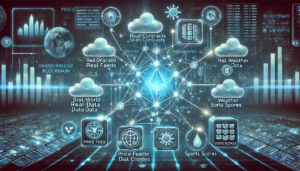
Netherlands, 11 Feb 2025–Digital transactions became better through blockchain technology which created trustworthy and distributed financial tools. Blockchains work inside a protected space that stops the access of real-world information such as market values or game results. Decentralized oracles create a link between smart contracts that exist within the blockchain and real-world data sources.
This article examines how decentralized oracles boost blockchain effectiveness by supporting DeFi platforms NFT technology and smart contracts while creating new features for Web3 applications.
What Are Decentralized Oracles?
A decentralized oracle is a blockchain-based service that provides trusted real-world data to smart contracts while preserving secure blockchain elements. Centralized oracles use a single data source for information but decentralized oracles collect data from several sources to deliver reliable and accurate results.
How Decentralized Oracles Work?
- A contract on the blockchain system demands data from external commercial resources including cryptocurrency value feeds.
- A decentralized oracle retrieves information from different off-chain sources which include APIs IoT devices and market feeds.
- The oracle network checks the accuracy of data through parallel comparisons of different sources to shield it from intentional modification.
- The blockchain smart contract runs when it receives verified data delivered from the network.
This system delivers perfect and protected blockchain data to applications which need decentralized oracles to function across all use cases.
Why Are Decentralized Oracles Essential for Blockchain?
1. Enabling DeFi Applications
DeFi platforms need accurate price information in real time to operate their lending and trading services. Oracles deliver precise currency values to all decentralized exchange and lending platform operations throughout the blockchain ecosystem. DeFi platforms would struggle with realistic market references because oracles provide important price validation protection against scams and incorrect transactions.
2. Powering Smart Contracts
Smart contracts need external information to work automatically but help manage transactions. For example:
- Weather information from oracles activates insurance contracts to provide crop insurance payments when severe weather occurs.
- The supply chain system automatically updates shipments throughout their journey to track correct delivery information.
- Sports betting contracts turn to sports score providers to determine betting outcomes as matches unfold.
3. Enhancing NFT and Gaming Applications
Decentralized oracles let you connect data from physical occurrences to decentralized games and NFT systems. They enable:
- NFTs that transform their features live by responding to actual sports events such as player stats or results.
- Games receive prizes from sports results and user progress tasks within the games.
- Online asset protection tools make sure that digital asset owners keep their NFTs free from scamming in purchase deals.
4. Cross-Chain Interoperability
Decentralized oracles help blockchain systems connect with each other by transferring data between various Web3 applications. Chainlink and Band Protocol help blockchains communicate with each other through their data services.
5. Improving Transparency and Security
Each decentralized node in the network reduces failure probability because data collection happens across multiple systems. The decentralized structure of oracle networks prevents manipulation by using cryptographic proof methods combined with reward structures.
Top Decentralized Oracle Projects
Different oracle network projects create safe and expandable blockchain data solutions.
1. Chainlink (LINK)
Chainlink acts as the leading decentralized oracle network that offers secure data supply to multiple DeFi products alongside NFT tools and enterprise programs. It enables:
- Decentralized exchanges need dependable price information from secure sources.
- Ensuring insurance contracts have reliable weather measurements.
- Cross-chain communication through its Chainlink Cross-Chain Interoperability Protocol (CCIP).
2. Band Protocol (BAND)
Band Protocol provides blockchain networks with secure off-chain data connections across different smart contract platforms. It is known for:
- Fast data aggregation for real-time applications.
- Multi-blockchain compatibility, supporting Ethereum, Binance Smart Chain, and Cosmos.
- The company charges less money for transactions than many other providers in its field.
3. API3
API3 functions as an oracle system that lets data source companies connect directly to smart contracts without relying on outside network services. This ensures:
- Greater transparency in data sourcing.
- Lower attack vectors due to fewer intermediaries.
- Improved data accuracy with verifiable sources.
4. DIA (Decentralized Information Asset)
DIA offers a financial data service that relies on crowd verification to make DeFi platforms more transparent. It uses:
- Members of the community check data to prevent unauthorized changes.
- Open-source architecture for transparency.
- Our professional price supply sources help DeFi loans and trades work better.
Challenges Facing Decentralized Oracles
Decentralized oracles help make blockchains secure and handle more transactions but they deal with specific difficulties.
1. Oracle Manipulation Attacks
Several price manipulation exploits during flash loan attacks damaged oracle-based DeFi protocols.
2. Latency Issues
Executing instant applications becomes hard because blockchain confirms data at a slower pace.
3. Cost and Scalability
Operating independent data validation servers requires money that increases transaction charges more in busy blockchains that need high processing fees.
4. Regulatory Considerations
More companies adopt blockchain technology regulators may start to define data accuracy needs and financial control methods that help determine how decentralized oracles work in controlled sectors.
The Future of Decentralized Oracles
Blockchain technology expansion into different business areas will drive a rise in decentralized oracle use. Key developments include:
- Digital systems use artificial intelligence technology to boost trading and financial services forecasting.
- Zero-knowledge proof oracles enable secure private data sharing between users.
- Oracle systems get four separate upgrades to avoid total system breakdowns.
- We initiate activities across automotive, energy and logistics companies to enter new markets.
Final Thoughts
Decentralized oracles provide essential links that connect blockchain technology to practical uses in real life. Zero-knowledge-proof data enables all DeFi platforms and applications including NFTs, gaming, and blockchain compatibility. As blockchain continues to develop decentralized oracles will take on more important responsibilities in running smart contracts.
For more updates on blockchain innovations, DeFi, and oracle technology, visit digital currency news and stay ahead of the latest trends in the blockchain space.
Media info:
Blockchain News
Website: http://www.the-blockchain.com
Email: advertising@the-blockchain.com
Address: BL205, Kerklaan 30, Haren, Netherlands

